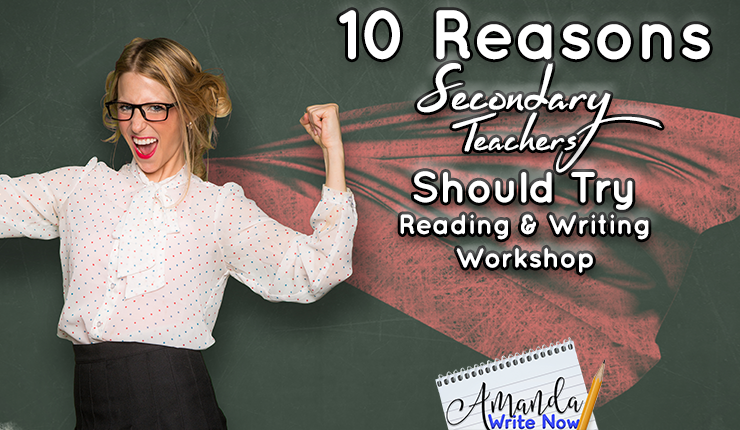
Don’t have time to read this article? Listen on iTunes instead!
We all have our own curriculum, our own teaching teams, our own way of doing things but it’s summer vacation and time to ponder other options! This article is meant for secondary teachers who are on the fence about whether to try reading and writing workshop in their class next year. Below you’ll find ten convincing (I hope) reasons why you should definitely give workshop a chance!
Before I start going into why you should use the workshop method, let’s discuss what workshop is in the first place. The pie chart to the right breaks down the workshop period into three chunks. The first chunk is a short mini lesson. Afterward students have time to read/write/practice skills they learned. During this time the teacher holds conferences with individuals/groups. Finally workshop ends with an opportunity for students to share/reflect. The structure is quite simple but is incredibly powerful!
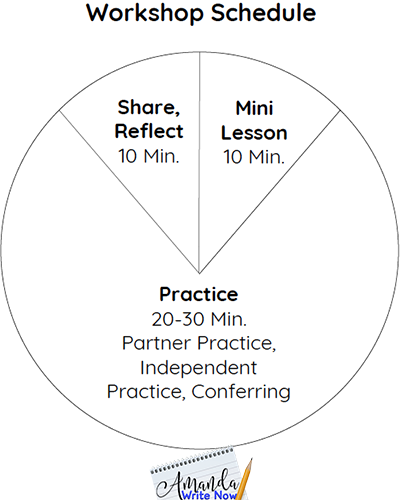
1. Lesson Planning is Easier
Okay, have you ever stayed up late creating a fancy PowerPoint (or nowadays Google Slideshow) only to find you made it too long and students are beginning to get a bit antsy as you go over the slides?
With the workshop method you have to keep your lessons short (I set a timer for ten minutes and try never to go over). When your lessons are short, you alert students that these ten minutes are the precious moments when they must pay close attention, students pick up their pencils and sit up a little taller when they know the mini lesson is happening.
During the mini lesson you pour out the essentials, in a concise way. There is no fluff in a mini lesson, every word is important. Your teaching must be direct.
In the video to the above, Lucy Calkins, one of the leaders and founders of the writing workshop method, discusses why teachers should use mini lessons and provides examples of the content within a mini lesson. She also admits sometimes mini lessons can go over ten minutes.
When I plan my mini lessons here’s what I usually include:
- A hook (video, story, analogy, connection),
- One specific skill or concept to teach (narrative, information, argument, reading)
- Mentor text to reveal more about the skill/concept
- My notebook so I can write in front of students
If you need mini lesson ideas definitely check out this page.
2. Differentiation is Easier
Conferencing with students while they are reading and writing is one of my absolutely favorite parts about teaching using the workshop method. Teaching isn’t about standing up in front of your classroom and spouting off all you know. Teaching is about sitting side by side with your students and listening.
I know that sounds crazy. Yes you have knowledge to dispense and you do in your mini lessons and after listening and asking questions during conferences. Students are incredibly honest and will tell you outright when they are struggling. If they don’t it will be really obvious when you read a bit from their notebook or you listen to them talk about their reading life or the book they are currently reading.
3. Students Build Independence
One of the most important goals English teachers have for their students is independence. Are students able to apply what they’ve learned in their lives outside of school, when the teacher isn’t around? The workshop model is brilliant because this is exactly the goal for every unit. Yes skills are important but so is behavior! Are students engaged? Are they being productive even when the teacher is not around?
When you use the workshop method writing and reading is done for a authentic purposes. In a writing unit students have a publishing deadline. In a reading unit students have a deadline for discussions, book club meetings or Socratic Seminars. So, the work students are doing leads to real world purposes and their work being viewed and assessed by audiences! When students know there is a deadline and their work will be seen by real people work independence goes through the roof and the likelihood that students will feel pride and continue this work in their personal lives goes up.
4. Students Develop Stamina
Stamina is being able to do something for a long period of time without giving up. Workshop requires stamina. When you implement this method in a, say 54 minute period, students are writing/reading for a good half an hour to forty minutes of that time everyday. If you allow them to work the majority of your workshop time they will develop stamina for reading books and writing.
5. Community is Strengthened
Teaching with the workshop model requires honesty, a willingness to take risks, to make mistakes and the teacher models all of these behaviors every day in her mini lessons as well as when interacting with students. Mistakes, roadblocks, struggles and frustration should be accepted, discussed and even praised! Students thrive in environments where they know they won’t be judged and knowing that even the teacher struggles and is a learner takes so much of the pressure off!
6. Assessment is Easier
Yes you read that right. Assessment is easier! The reason for this is because I assess students every day in the moment. I carry a clipboard everywhere I go during work time. The clipboard includes a class roster and a page to take notes on individual students during conferences.
Some of the skills assessed in the moment include: on-task behavior, pre-writing strategies, drafting stamina, revision strategies, ability to work with a partner/in a group, library behavior, ability to choose an engaging book to name a few. Since I have 150+ students every year it is essential that I assess as much as I can in class, while with the students. This doesn’t mean I’m entering grades into the grade book while students are there. But it does mean that I am constantly documenting skill progress on my clipboard and then transferring it to the grade book during my prep period.
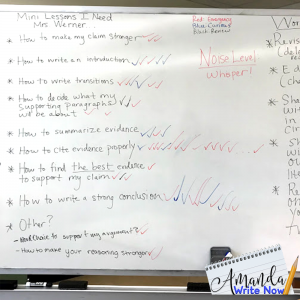
I also ask students directly what they are struggling with so that I can teach mini lessons about those concepts the next day. One way to do this is by writing a whole bunch of skills and having your students write a check mark next to skills they need help with. You can see an example of this way of assessing to the left. Self-assessment and peer assessment are also powerful ways to cut down on grading
I always have students assess themselves and each other using a checklist before submitting a final paper for me to assess.Yes those weeks after a unit is over are rough because I have 150+papers to grade. But, it is much easier when I have knowledge of the skills the student struggled with from my conference notes and the self and peer assessments to guide me in my decision making. My school also purchased Turnitin.com which is another life saver when it comes to grading!
7. Students Enjoy it
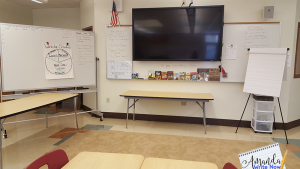
Okay not all students love reading and writing after taking my class. But, I know students get bored when the entire class period is spent listening to the teach or working through writing an essay step by step and not being allowed to go at their own pace. How do I know this? Well…because I’ve been in classes like this and it is boring! Students want time for themselves. They want time to work on the concepts and skills with their friends in the class, they want freedom and choice and workshop allows for that.
Many middle school students also very much enjoy the meeting area aspect of workshop because it is reminiscent of elementary school days and they miss those times! I let my students sit on tables, the counter, the rug and those that are close can stay at their desks. The picture to the left is of my meeting area. The easel is for creating writing charts which is also an important component of implementing the writing workshop method in your class.
8. Finished Products are Authentic
Workshop requires authentic audiences. Students always have a deadline they are working toward and an audience they are writing for that includes others besides the teacher. Read this article for ten ways to publish your students’ writing. But what about when it comes to reading? I believe that book talks (recommending books to the class), Socratic Seminars, book club meetings, writing book reviews on Goodreads and performing a a play are all authentic ways to showcase reading skills. The more authentic the culminating event of any unit is the more invested and motivated students will be throughout the unit!
9. There are so Many Resources
Heinemann is the go to place for official workshop curriculum. But there are also so many wonderful websites dedicated to helping writing and reading teachers master their craft. Here are a few of my very favorites:
10. You’ll Enjoy It
There are so many innovative ways to teach these days such as flipping your classroom, flexible seating, the mindful minute, Project Based Learning, STEM and more that I can’t think of right now. Have you tried any of these new ways to teach? I’ve definitely dabbled in all of them and see so much value in these methods and really in every new trend in education for that matter. Why? Because changing things up keeps me learning, growing and enjoying my job. So…if you are one of those teachers who likes to try new things, then you’ll love the workshop method. I just know it! I am convinced that workshop is not just for elementary, it is for middle and high school too. How about you?
Related Articles
Students Don’t Write During Writing
Whole Novels Reading Workshop Style
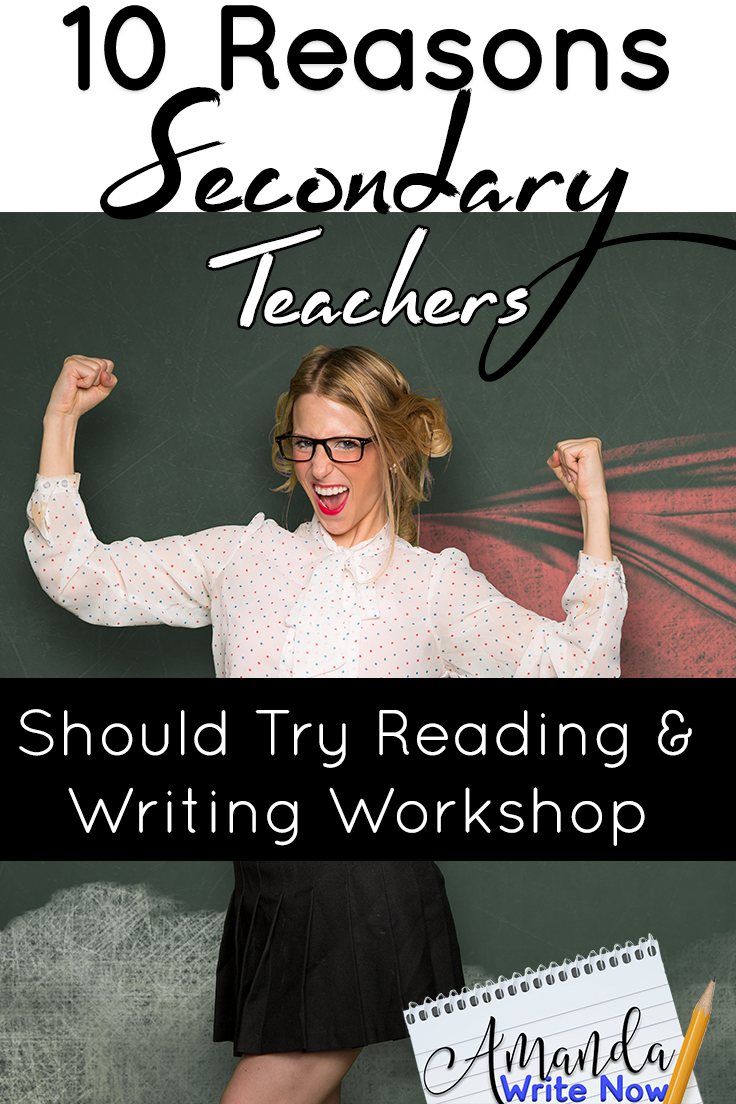
0 Comments